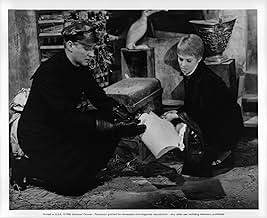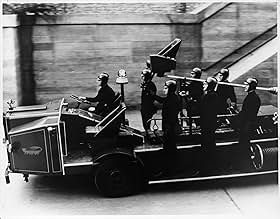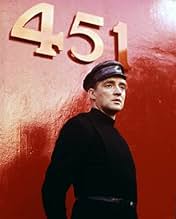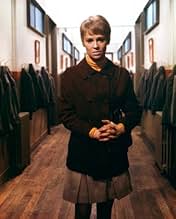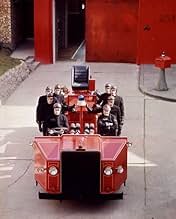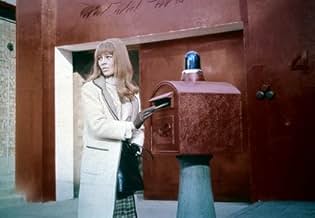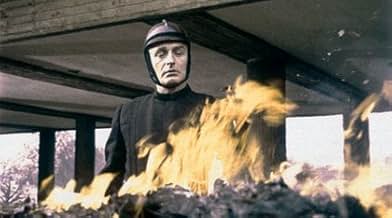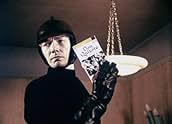IMDb रेटिंग
7.2/10
47 हज़ार
आपकी रेटिंग
अपनी भाषा में प्लॉट जोड़ेंIn an oppressive future, a fireman whose duty is to destroy all books begins to question his task.In an oppressive future, a fireman whose duty is to destroy all books begins to question his task.In an oppressive future, a fireman whose duty is to destroy all books begins to question his task.
- 1 BAFTA अवार्ड के लिए नामांकित
- 1 जीत और कुल 4 नामांकन
Gillian Aldam
- Judoka Woman
- (बिना क्रेडिट के)
Michael Balfour
- Book Person: Machiavelli's 'The Prince'
- (बिना क्रेडिट के)
Alfie Bass
- Book Person: 'The Prince'
- (बिना क्रेडिट के)
Yvonne Blake
- Book Person: 'The Jewish Question'
- (बिना क्रेडिट के)
Arthur Cox
- Male Nurse
- (बिना क्रेडिट के)
Frank Cox
- Book Person: 'Prejudice'
- (बिना क्रेडिट के)
Fred Cox
- Book Person: 'Pride'
- (बिना क्रेडिट के)
Noel Davis
- Cousin Midge - TV Personality
- (बिना क्रेडिट के)
Judith Drinan
- Book Person - Plato's 'Republic'
- (बिना क्रेडिट के)
Kevin Eldon
- Robert - First Schoolboy
- (बिना क्रेडिट के)
फ़ीचर्ड समीक्षाएं
Ray Bradbury's disturbing vision of a possible future comes vividly alive in this film adaption of Fahrenheit 451. Reading for pleasure is now banned although I imagine you must have a certain degree of literacy to read food can labels and directions to operate all kinds of machinery. But read for enjoyment or for education about the world beyond the small space of earth you frequent, that's a big no-no in this future America.
Oskar Werner stars in Fahrenheit 451, he plays a fireman who have a different function in this society. Buildings and such are now fireproof so fireman have become the enforcers of the ban against books. They seek and burn books in whatever quantities they find. A good job in a police state, but not a good one if you have an inquiring mind such as Werner has.
Julie Christie plays two roles, Werner's pleasure driven wife and a schoolteacher whose unorthodox for that society's teaching methods have brought her under scrutiny. She does a good job in both characterizations.
Bradbury's themes are grounded in reality. Looking at American history it was a crime in many slave holding states to educate a slave. Let them be happy in their ignorance and they might not get ideas about a better life and won't rebel.
But this is a society that's beyond that kind of formal slavery so the answer is the old Roman one of bread&circuses. The circus in this case is television which has evolved into an interactive medium. The vast wasteland that Newton Minow characterized television as back in the day has gone beyond anything Minow was having visions about. Entertainment has really dumbed down and the circuses aren't too far from what used to entertain the Romans.
In the supporting cast you will remember Cyril Cusack as the fire brigade captain who functions as the spokesman for this new world and Bee Duffring as the book lady who martyrs herself for knowledge in an unforgettable scene.
The ending is not Bradbury's, but one written by director Francois Truffaut. It is very much however in the spirit of the novel and a tribute to mankind's unquenchable thirst for knowledge. Don't miss Fahrenheit 451 when broadcast.
Oskar Werner stars in Fahrenheit 451, he plays a fireman who have a different function in this society. Buildings and such are now fireproof so fireman have become the enforcers of the ban against books. They seek and burn books in whatever quantities they find. A good job in a police state, but not a good one if you have an inquiring mind such as Werner has.
Julie Christie plays two roles, Werner's pleasure driven wife and a schoolteacher whose unorthodox for that society's teaching methods have brought her under scrutiny. She does a good job in both characterizations.
Bradbury's themes are grounded in reality. Looking at American history it was a crime in many slave holding states to educate a slave. Let them be happy in their ignorance and they might not get ideas about a better life and won't rebel.
But this is a society that's beyond that kind of formal slavery so the answer is the old Roman one of bread&circuses. The circus in this case is television which has evolved into an interactive medium. The vast wasteland that Newton Minow characterized television as back in the day has gone beyond anything Minow was having visions about. Entertainment has really dumbed down and the circuses aren't too far from what used to entertain the Romans.
In the supporting cast you will remember Cyril Cusack as the fire brigade captain who functions as the spokesman for this new world and Bee Duffring as the book lady who martyrs herself for knowledge in an unforgettable scene.
The ending is not Bradbury's, but one written by director Francois Truffaut. It is very much however in the spirit of the novel and a tribute to mankind's unquenchable thirst for knowledge. Don't miss Fahrenheit 451 when broadcast.
Go figure that I had the privilege of seeing "Fahrenheit 451," for free, on a big screen a few years back (an independent Illinois art house had gotten hold of what was allegedly one of the last surviving prints), and at the time hadn't the foggiest concept of how PRIVILEGED an event it was. Sitting in a theater crowded with college students on a budget with nothing better to do, I watched this diverting little retro item, appreciated its subtlety, nuance, bold visual style, and 'got' the message that if we're not careful, we'll be mindless drones having our desires dictated by The Tube (in current times, that's hardly a profound statement).
Francois Truffaut's adaptation of Ray Bradbury's novel is a bold visual feast that presents a time that might seem 'retrograde' in the eye of a modern pop-culture snob, but ultimately projects what a conceivable 'future' might look like (and not that CGI malarkey served up in "The Matrix"). Interiors of houses are awash in odd colors and give shelter to appliances that don't look dissimilar from our own; TV screens embedded in living-room walls play programs which vacuous housewives interact with sometimes. The film is so relentlessly confident in its appearance that it withstands the test of time.
Though if "Fahrenheit 451" only had its storybook style to rely on, it would fade and be filed away as a mere technical achievement. Truffaut, working from strong source material, concocts a riveting parable about ignorance and the things we, as humans, take for granted. The story follows Guy Montag, an Everyman who is employed as a fireman--a connotation which entails ransacking residences in search of books (reading and writing have been outlawed in this world) and burning them. He has a medicated-smile wife (Julie Christie), a quiet home life, and is in line for a promotion, until a neighbor (Christie again) inspires him to question his motives for working such a sordid job.
One character argues that books cause depression, making people confront unpleasant feelings. "Fahrenheit 451" sometimes runs the risk of lending truth to that statement--in some ways, it is a bleak commentary on civilization, but at the same time grounded in a benevolent humanity that offsets Orwell's brutal, pessimistic world of "1984" (though both texts and films share similar themes). This humanity is underlined in an upbeat, even comic ending (the details of which I won't divulge here).
"Fahrenheit 451" is a spellbinding work of art, in good company with other incendiary works ("A Clockwork Orange" and "Fight Club" come to mind) that have defied the constraints of time and age.
Francois Truffaut's adaptation of Ray Bradbury's novel is a bold visual feast that presents a time that might seem 'retrograde' in the eye of a modern pop-culture snob, but ultimately projects what a conceivable 'future' might look like (and not that CGI malarkey served up in "The Matrix"). Interiors of houses are awash in odd colors and give shelter to appliances that don't look dissimilar from our own; TV screens embedded in living-room walls play programs which vacuous housewives interact with sometimes. The film is so relentlessly confident in its appearance that it withstands the test of time.
Though if "Fahrenheit 451" only had its storybook style to rely on, it would fade and be filed away as a mere technical achievement. Truffaut, working from strong source material, concocts a riveting parable about ignorance and the things we, as humans, take for granted. The story follows Guy Montag, an Everyman who is employed as a fireman--a connotation which entails ransacking residences in search of books (reading and writing have been outlawed in this world) and burning them. He has a medicated-smile wife (Julie Christie), a quiet home life, and is in line for a promotion, until a neighbor (Christie again) inspires him to question his motives for working such a sordid job.
One character argues that books cause depression, making people confront unpleasant feelings. "Fahrenheit 451" sometimes runs the risk of lending truth to that statement--in some ways, it is a bleak commentary on civilization, but at the same time grounded in a benevolent humanity that offsets Orwell's brutal, pessimistic world of "1984" (though both texts and films share similar themes). This humanity is underlined in an upbeat, even comic ending (the details of which I won't divulge here).
"Fahrenheit 451" is a spellbinding work of art, in good company with other incendiary works ("A Clockwork Orange" and "Fight Club" come to mind) that have defied the constraints of time and age.
As an avid reader and lifelong book lover, there's no way this movie couldn't affect me personally! A world without books??? NEVER!!! Whether paper, online or audio, they'd better be here to stay!!!!
The movie gets off to a good start, by showing the firemen off to what at first you may think is to fight a fire, when actually they're going to start one, by searching for and burning books! In this society, they're banned (why make people think and learn, when the soulless robots on what passes for TV can do your thinking for you and teach you enough to live in their one-dimensional society?)
The number 451 pops up all over: at the fire station, at the address of the fireman-turned-rebel, Montag (Oskar Werner), and of course, it's the temperature that paper from those outlawed books will burn! You see conflagration after conflagration of precious volumes and titles set to flame, all for your own good, of course!
Oskar does a good job as a dedicated servant of this braindead society, who comes to realize how wrong it is, and starts fighting back, even if it means committing an unforgivable crime.
Julie Christie also does good in a dual role; as Montag's wife, Linda, who listens more to the "family" on the TV screen than to her husband, and as Clarisse, a nonconformist schoolteacher that Montag gets to know while commuting to and from work. Through her, he learns there's more to life than he's been living, and much of that can be learned through those volumes he keeps destroying. When Clarisse asks if he ever read any of those confiscated books, he soon finds himself looking through a volume of "David Copperfield", and nothing's the same after that.
It's worth noting how something as simple as a hairstyle can enhance characterization. As Linda, Julie's hair is long and stylish (as are her clothes) and she gives a fashion model appearance. Her character, however, is vapid and bland. Aside from her addiction to TV and pills, she seems soulless and unfeeling. Even her seduction of Montag (not long after getting her stomach pumped) comes across as mechanical, without any real desire. She can't even remember when they first met, which gives you an idea of her true feelings for her husband!
As the short haired, plainly dressed Clarisse, Julie really becomes a whole other person, one who thinks for herself, feels strongly, and cries when a little boy at the school from where she's been fired (Mark Lester, two years before "Oliver") runs away from her. Unlike all the other modern, fireproof structures, she lives in an older building, that may be flammable but has a lot of character.
What stands out most is the solution a group of nonconformists found to the problem of destroyed books, a way to ensure they live on!! It gives what could have been a dismal film an upbeat ending.
Well worth watching!
The movie gets off to a good start, by showing the firemen off to what at first you may think is to fight a fire, when actually they're going to start one, by searching for and burning books! In this society, they're banned (why make people think and learn, when the soulless robots on what passes for TV can do your thinking for you and teach you enough to live in their one-dimensional society?)
The number 451 pops up all over: at the fire station, at the address of the fireman-turned-rebel, Montag (Oskar Werner), and of course, it's the temperature that paper from those outlawed books will burn! You see conflagration after conflagration of precious volumes and titles set to flame, all for your own good, of course!
Oskar does a good job as a dedicated servant of this braindead society, who comes to realize how wrong it is, and starts fighting back, even if it means committing an unforgivable crime.
Julie Christie also does good in a dual role; as Montag's wife, Linda, who listens more to the "family" on the TV screen than to her husband, and as Clarisse, a nonconformist schoolteacher that Montag gets to know while commuting to and from work. Through her, he learns there's more to life than he's been living, and much of that can be learned through those volumes he keeps destroying. When Clarisse asks if he ever read any of those confiscated books, he soon finds himself looking through a volume of "David Copperfield", and nothing's the same after that.
It's worth noting how something as simple as a hairstyle can enhance characterization. As Linda, Julie's hair is long and stylish (as are her clothes) and she gives a fashion model appearance. Her character, however, is vapid and bland. Aside from her addiction to TV and pills, she seems soulless and unfeeling. Even her seduction of Montag (not long after getting her stomach pumped) comes across as mechanical, without any real desire. She can't even remember when they first met, which gives you an idea of her true feelings for her husband!
As the short haired, plainly dressed Clarisse, Julie really becomes a whole other person, one who thinks for herself, feels strongly, and cries when a little boy at the school from where she's been fired (Mark Lester, two years before "Oliver") runs away from her. Unlike all the other modern, fireproof structures, she lives in an older building, that may be flammable but has a lot of character.
What stands out most is the solution a group of nonconformists found to the problem of destroyed books, a way to ensure they live on!! It gives what could have been a dismal film an upbeat ending.
Well worth watching!
From Ray Bradbury's novel about totalitarian society that has banned books and printed words in order to eliminate independent thought; Oskar Werner plays professional book-burner who becomes enraptured with stories. Possibly a bit too thin at this length, but a fascinating peek at a cold future (which the times have just about caught up to). Didn't get a warm reception from critics in its day, yet the performances by Werner and Julie Christie (in a dual role as both Werner's wife and a rebel acquaintance) are top notch. I was never a fan of director François Truffaut's too-precious stories of childhood, but this film, curiously his only English-language picture, is extremely well-directed; the sequence with the woman and her books afire is one amazing set-piece, with tight editing, incredible and precise art direction, and the camera in all the right places. Truffaut lets you feel the agony of book paper curling up black in a mass of orange flames, and the proud defiance of the woman as she herself strikes the match. Unforgettable. *** from ****
In a future where books have been outlawed, firemen are paid to burn books instead of put fires out. However, one fireman realizes that what he is doing is wrong and decides to go against the degenerate society he lives in.
I have read reviews of this movie calling it "boring" and "outdated," and frankly I am amazed by how ignorant some people can be. Calling "Fahrenheit 451" outdated simply because the set designs look old and because there are no flashy computer effects shows that you have completely missed the point. The people who made this were not trying to give you a spectacle, they were trying to give you a message - a message that is even more important today than it was when this movie came out.
"Fahrenheit 451" is a fine adaptation of Ray Bradbury's classic novel about censorship. The movie changes many of the book's events, but the spirit of the book is preserved. The cinematography is truly great and the score is quite powerful. The acting is also great. Oskar Werner is right on the money as Montag the fireman. Julie Christie is wonderful playing dual roles as yin and yang: Montag's zombie-like wife, Linda, and Montag's friend, the young and energetic Clarisse. Cyril Cusack is also memorable as the evil Fire Captain Beatty - he isn't a cartoon villain, but a very realistic and human character.
You may think that "Fahrenheit 451" delivers an irrelevant message. You may think that book burning is a thing of the past, a relic of Nazi Germany and Communist Russia. Look around you - book burning happens every day! How do you feel about people trying to ban "The Adventures of Huckleberry Finn" because the word "nigger" is used in it? How about whole sections of "Doctor Dolittle" being rewritten so that they are politically correct? Did you know that school textbooks may not make any mention of Mount Rushmore because it is offensive to a certain Indian tribe? Meanwhile, we are watching our giant-screen TVs and listening to our Walkmans (two inventions that were predicted by Bradbury). We are constantly "plugged in" and never take any time to just sit and think. Look around you - Ray Bradbury's story is coming true. I advise you to watch this movie, and to read the book. (Read the book first. You will appreciate the film more.)
I hear that a remake is in the works. No doubt it will be filled with gaudy special effects and silly Hollywood cliches. I guess I should hold off judgment until I actually see it, but I doubt that it will contain any of the genius that can be found in this sadly underrated gem. It will be interesting to see what they do with the mechanical hound, though....
I have read reviews of this movie calling it "boring" and "outdated," and frankly I am amazed by how ignorant some people can be. Calling "Fahrenheit 451" outdated simply because the set designs look old and because there are no flashy computer effects shows that you have completely missed the point. The people who made this were not trying to give you a spectacle, they were trying to give you a message - a message that is even more important today than it was when this movie came out.
"Fahrenheit 451" is a fine adaptation of Ray Bradbury's classic novel about censorship. The movie changes many of the book's events, but the spirit of the book is preserved. The cinematography is truly great and the score is quite powerful. The acting is also great. Oskar Werner is right on the money as Montag the fireman. Julie Christie is wonderful playing dual roles as yin and yang: Montag's zombie-like wife, Linda, and Montag's friend, the young and energetic Clarisse. Cyril Cusack is also memorable as the evil Fire Captain Beatty - he isn't a cartoon villain, but a very realistic and human character.
You may think that "Fahrenheit 451" delivers an irrelevant message. You may think that book burning is a thing of the past, a relic of Nazi Germany and Communist Russia. Look around you - book burning happens every day! How do you feel about people trying to ban "The Adventures of Huckleberry Finn" because the word "nigger" is used in it? How about whole sections of "Doctor Dolittle" being rewritten so that they are politically correct? Did you know that school textbooks may not make any mention of Mount Rushmore because it is offensive to a certain Indian tribe? Meanwhile, we are watching our giant-screen TVs and listening to our Walkmans (two inventions that were predicted by Bradbury). We are constantly "plugged in" and never take any time to just sit and think. Look around you - Ray Bradbury's story is coming true. I advise you to watch this movie, and to read the book. (Read the book first. You will appreciate the film more.)
I hear that a remake is in the works. No doubt it will be filled with gaudy special effects and silly Hollywood cliches. I guess I should hold off judgment until I actually see it, but I doubt that it will contain any of the genius that can be found in this sadly underrated gem. It will be interesting to see what they do with the mechanical hound, though....
क्या आपको पता है
- ट्रिवियाThe film's credits are spoken, not read, in keeping with the film's theme of destruction of reading material.
- गूफ़After Montag comes out of the first raid to burn the books, the placement of the fire protective clothing (helmet and gloves) are unnatural movements and appear to be a reverse run of film footage. This is further compounded by the fact that he walks backwards to get the flamethrower which has flame entering the nozzle instead of leaving the nozzle.
- भाव
Guy Montag: To learn how to find, one must first learn how to hide.
- क्रेज़ी क्रेडिटThe beginning credits are spoken instead of written on the screen.
- इसके अलावा अन्य वर्जनOriginally Noel Davis (who plays Cousin Midge) did the opening voice over. In the current version it is done by Alex Scott ("The Life of Henry Brulard" Book Person).
- कनेक्शनFeatured in Night Gallery: The Different Ones/Tell David.../Logoda's Heads (1971)
टॉप पसंद
रेटिंग देने के लिए साइन-इन करें और वैयक्तिकृत सुझावों के लिए वॉचलिस्ट करें
- How long is Fahrenheit 451?Alexa द्वारा संचालित
विवरण
- रिलीज़ की तारीख़
- कंट्री ऑफ़ ओरिजिन
- आधिकारिक साइटें
- भाषाएं
- इस रूप में भी जाना जाता है
- Farenhajt 451
- फ़िल्माने की जगहें
- Châteauneuf-sur-Loire, Loiret, फ़्रांस(Monorail)
- उत्पादन कंपनियां
- IMDbPro पर और कंपनी क्रेडिट देखें
बॉक्स ऑफ़िस
- बजट
- $15,00,000(अनुमानित)
- US और कनाडा में सकल
- $509
- US और कनाडा में पहले सप्ताह में कुल कमाई
- $11,206
- 25 अप्रैल 1999
- दुनिया भर में सकल
- $581
- चलने की अवधि1 घंटा 52 मिनट
- पक्ष अनुपात
- 1.66 : 1
इस पेज में योगदान दें
किसी बदलाव का सुझाव दें या अनुपलब्ध कॉन्टेंट जोड़ें



